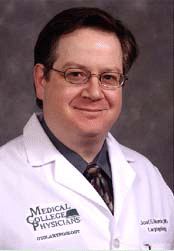WASHINGTON, DC-Non-acidic reflux is a major cause of laryngeal inflammation, and patients with this disorder present with a constellation of symptoms that differ from classic gastroesophageal reflux (GERD). The most common symptom is chronic laryngitis. The mechanisms of injury and pathophysiology of this disorder are still being elucidated, and there is no gold standard for diagnosis. Non-acidic reflux is an area of active research and several hypotheses explaining how injury occurs are currently being explored. Pepsin and bile appear to be implicated, according to research discussed at a session during the recent AAO-HNS annual meeting.
Explore This Issue
February 2008We are realizing that the non-acidic components of reflux are just as important as the acidic components. Non-response to acid suppression in some patients may indicate that the non-acidic components [bile and pepsin] are contributing to their symptoms. This message is important for otolaryngologists and for those patients who come in with symptoms that are not helped by acid suppression, said session chair Joel H. Blumin, MD, Associate Professor and Chief of the Division of Laryngology and Professional Voice at the Medical College of Wisconsin in Milwaukee.
Typical Scenario
The typical scenario is that patients come in with symptoms that appear to be related to GERD. They are treated with H2 blockers and/or proton pump inhibitors (PPI) and fail to respond, even if the dose of drug is increased or if H2 blockers are given at night, explained Jean Abitbol, MD, Ancien Chef de Clinique at the Faculty of Medicine of Paris. Postprandial symptoms are persistent and symptoms also occur at night.
Dr. Abitbol described three methods used to diagnose non-acidic reflux. pH testing shows that bile is not correlated with alkaline pH. pH testing alone cannot diagnose non-acidic reflux, he said. Impedance techniques are used to make the diagnosis. Bilirubin recording is a research tool that may prove useful. GABA-agonists, Baclofen, or surgery may be useful for management of non-acidic reflux, he said.
Clarence Sasaki, MD, Charles W. Ohse Professor and Chief of the Department of Otolaryngology at Yale University in New Haven, CT, who also spoke at the session, presented experimental data showing that bilirubin salts damage vocal cords of animal models, suggesting that bile plays a role in laryngeal injury in non-acidic reflux.
Role of Pepsin in Non-acidic Reflux
Recent research has implicated pepsin in causing damage in non-acidic reflux, explained Nikki Johnston, PhD, Assistant Professor in the Division of Research of the Department of Otolaryngology and Communication Sciences at the Medical College of Wisconsin, who has published in this area. Pepsin is detected in the laryngeal epithelium of patients with clinically diagnosed laryngopharyngeal reflux (LPR), but not in normal control subjects, she said.

Leave a Reply